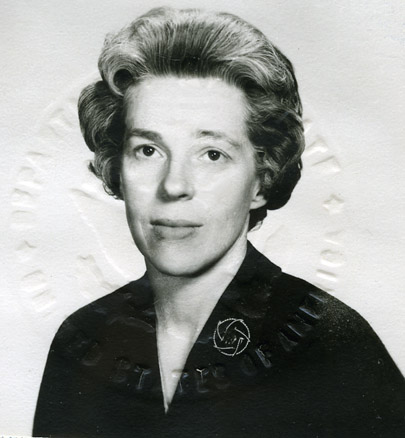Background on Miriam Usher Chrisman

Miriam Chrisman (passport photo), 1964
A noted scholar of the social impact of the German Reformation, Miriam Usher Chrisman was born in Ithaca, New York, on May 20, 1920. With degrees from Smith College, American University, and Yale, she served for over thirty years on the faculty of the Department of History at the University of Massachusetts Amherst, becoming a well-loved professor and treasured mentor to a generation of students.
From birth, Chrisman seemed destined for a career in academia. Chrisman's roots in the intellectual elite of Massachusetts ran deep -- an ancestor Hezekiah Usher, imported the press and type with which John Eliot's Indian Bible was printed -- and her father, Abbott Payson Usher, was a distinguished economic historian at Cornell and later Harvard. Graduating magna cum laude with an A.B. from Smith College (1941) shortly before the onset of the Second World War, Chrisman's plans for an academic career were delayed. After marrying Don Chrisman, a medical student at Harvard, on November 29, 1943, Miriam took a series of jobs with the federal government in Washington, D.C., while Don served on active duty with the Navy aboard the Gleaves-class destroyer, U.S.S. Baldwin in the Atlantic and Mediterranean.
At the end of the war, the Chrismans returned home to Massachusetts and settled in Northampton, where Donald began a practice in orthopedics at Cooley Dickinson Hospital while Miriam resumed her studies. After earning graduate degrees in education (Smith College, 1948) and economics (American University), she studied history at Yale (MA,1959, and PhD, 1962), completing her dissertation, "Church and city in Strasbourg, 1480-1548: A study of the stages of the Reformation," in 1962, just prior to joining the History Department at UMass Amherst.
During her long career, Chrisman became a leading authority on the social history of the German Reformation, the city of Strasbourg forming the intellectual locus of much of her work. The first of her seven books, Strasbourg and the Reform (1967), was quickly recognized as a landmark in its field, balancing an understanding of both high and low culture with an appreciation for the impact of the Reformation on the lives of the non-elite. In later works such as Lay Culture, Learned Culture: Books and Social Change in Strasbourg, 1480-1599 (1982) and Conflicting Visions of Reform: German Lay Propaganda Pamphlets, 1519-30 (1996), Chrisman explored the impact of print culture in German cities during the early Reformation, again with an eye on social movements and the common people. An avid world traveler, her several research trips to Strasbourg influenced her life in other ways: her experiences there and in other locations abroad led her husband, Donald, to embark on a second career in archaeology upon his retirement from medicine.
Widely recognized for her scholarship, Chrisman was awarded the Prix d'honneur by the Societe des Amis de Vieux Strasbourg, the Wilbur Cross Medal from Yale University, and received an honorary doctor of humane letters from Valparaiso University. She was twice awarded the UMass Chancellor's Medal, first as a Distinguished Faculty Lecturer in 1985 and again in 2000 for her support of the Du Bois Library. In her honor, the Society for Reformation Research established the Miriam U. Chrisman Travel Fellowship, which provides grants of $1500 every other year to support advanced graduate students in conducting research abroad. Chrisman formally retired in 1985, but continued to teach for almost a decade more.
Donald Chrisman died in 2002, with Miriam following on November 17, 2008. They are survived by two sons, Nicholas Ramsey Chrisman and David Abbott Chrisman.

